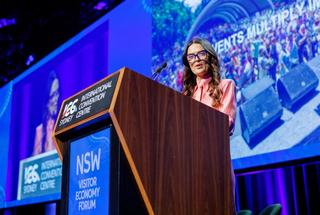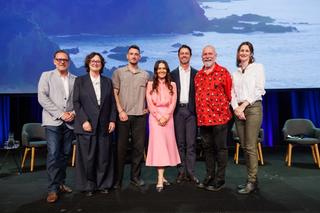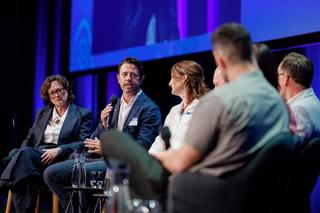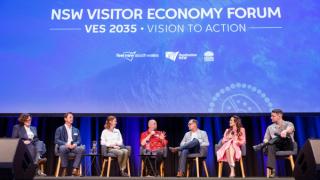The role business and leisure events play in attracting visitors to NSW was highlighted this week at the NSW Visitor Economy Forum 2025.
Featuring the theme 'NSW Visitor Economy Strategy 2035 – Vision to Action', event provided an opportunity for the Destination NSW leadership team and industry experts to share insights on the five pillars supporting the Strategy.

Destination NSW Acting General Manager Events Sarah Lovell (above) discussed pillar three of the Strategy – ‘Drive growth through events’.
A key objective of pillar three is to leverage and attract world-class entertainment, sport, cultural and business events to drive visitation, deliver economic, social and cultural benefits, stimulate regional growth and foster innovation in the knowledge economy.
“Events are powerful economic drivers. They stimulate visitation, extend stays and create repeat travel,” Ms Lovell.
“Among our areas of focus will be securing events that activate the fast-growing Western Sydney region; embedding Aboriginal culture into our events strategy as a central narrative; and expanding our major events calendar – securing and retaining high-impact events across sport, culture and business and ensuring they’re distributed across Sydney and regional NSW.”
Destination NSW is also refreshing its events strategy to ensure it is future-focused, inclusive and aligned with the NSW Government’s broader visitor economy goals.
This will include expanding the state’s major events calendar – securing and retaining high-impact events across sport, culture, and business – and ensuring they’re distributed across metro and regional NSW.
Destination NSW is strengthening our event assessment and investment processes to identify opportunities that deliver optimal economic, cultural, and community value – and to support innovation in event formats and delivery.
“We’re also enhancing how we promote events – through bold storytelling, audience segmentation, and data-led marketing to unlock deeper insights into visitor behaviour,” Ms Lovell said.
“We’re also working on a new activation approach – creating richer visitor experiences around events – integrating food, culture, local stories and regional activations to encourage longer stays and deeper engagement.”
Leveraging events to grow the visitor economy
Ms Lovell moderated a panel discussion during the NSW Visitor Economy Forum on how events can be leveraged to grow the visitor economy.

Panellists included Business Events Sydney CEO Amanda Lampe, Destination NSW Associate Director of Regional Conferencing Mitchell Gunn, Australian Centre for Regional Events Co-Founder Cathy Treasure, White Bay Power Station Manager of Arts, Culture and Creative Industries Craig Donarski, TCS Sydney Marathon Event Director Wayne Larden and Untitled Group Co-Founder and Managing Partner Michael Christidis.
“An event becomes a catalyst for growth when it’s designed with purpose,” Mr Donarski said.
“It’s not just about the spectacle – it’s about what it leaves behind. That could be increased visitation, stronger local businesses, new infrastructure or a shift in how people see a place. When events are embedded in broader strategies – tourism, transport and precinct activation – they become engines for growth, not just entertainment.”
Mr Donarski said regional events such as Parkes Elvis Festival and Deni Ute Muster were proof that focusing on niche areas or had a unique point of difference, rather than trying to be all things to all people, was one of regional NSW’s strengths.
“Successful regional events are authentic, community-backed, and reflect what’s unique about the region,” Ms Treasure said.
“They reinvent with community support, offer immersive experiences, and leave visitors feeling connected—turning attendees into advocates for the event and the destination.”

“We need to ensure regional NSW is part of the major events story by embedding regional destinations in bidding strategies, investing in infrastructure and capability, and marketing regional events with equal intensity,” Mr Gunn said.
“Regional NSW isn’t a side stage – it’s a strategic asset. Events should reflect local identity, support community priorities and be part of the state’s global pitch.”
Mr Larden said success in the global events sector required collaboration and a shared vision to ensure all stakeholders were heading in the same direction.
“Events must be embedded in broader strategies – not bolted on. They should drive demand for aviation, fill accommodation and support precinct activation,” he said.
“When integrated with data, infrastructure, and community planning, events become levers for growth – not just moments in time.”
Panellists agreed NSW was well-positioned to dominate Australia’s business events sector, by securing high-value conferences, exhibitions and corporate incentives.
“To lead in this sector, we need a whole-of-government approach, bold targets and a mindset shift: from hosting events to shaping industries,” said Ms Lampe.
“Business events are often invisible to the public – yet they shape industries, cities, and futures. We need to tell their stories better: through media, precinct activation, and public programming. Imagine a conference that spills into the streets – with pop-ups, performances and public debates. That’s how you build relevance – and resonance.”
